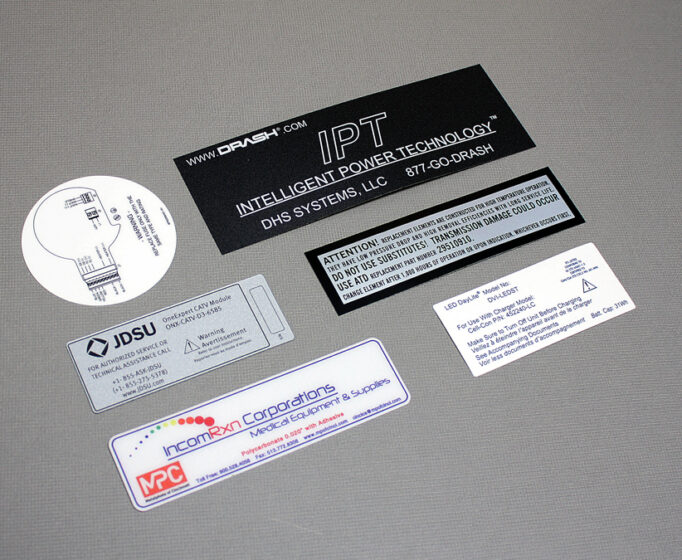The Hidden Value of Plastic Nameplates in Competitive Marketing
The Hidden Value of Plastic Nameplates in Competitive Marketing
Blog Article
Exactly How Plastic Nameplates Are Manufactured: A Comprehensive Guide to Their Manufacturing Refine
The manufacturing of plastic nameplates entails a number of exact actions, starting from the choice of suitable materials to the last finishing touches. Each stage is important, ensuring the item meets specific requirements for durability and aesthetics. Different manufacturing methods play a substantial function in crafting these nameplates. Understanding these procedures can clarify the intricacies behind what might look like a simple item. What factors add to the top quality and personalization of these nameplates?
Comprehending Plastic Products Made Use Of for Nameplates

The Style Process: From Principle to Prototype
The design process for plastic nameplates starts with a clear concept that guides the overall production. Developers collaborate with clients to define the objective, design, and details demands of the nameplate. This initial phase includes brainstorming sessions, laying out ideas, and choosing colors and font styles that line up with branding goals.Once the concept is established, designers use computer-aided layout (CAD) software to produce detailed electronic representations. These models enable for visualization and modifications before moving on. Feedback from stakeholders is essential throughout this stage, as it assists improve the style to meet expectations.After finalizing the electronic prototype, a physical design might be generated, usually with techniques like 3D printing. This substantial representation makes it possible for additional analysis of aesthetic appeals and functionality. Generally, the layout procedure is a necessary step that lays the structure for the efficient production of high-grade plastic nameplates.
Reducing and Forming the Plastic
In the cutting and forming stage of plastic nameplate production, the option of materials plays a necessary role in determining the last item's quality and toughness (Plastic Nameplates). Various accuracy cutting methods, such as laser cutting and CNC machining, guarantee that the plastic is shaped with precision and uniformity. This combination of cautious product option and advanced cutting approaches is important for generating premium nameplates

Product Selection Refine
Selecting the appropriate product is necessary for generating high-quality plastic nameplates. Various kinds of plastics are readily available, each offering distinct advantages and features. Typical selections consist of acrylic, polycarbonate, and PVC. Acrylic is favored for its clearness and UV resistance, making it ideal for outside applications. Polycarbonate, known for its toughness and effect resistance, appropriates for atmospheres that need improved protection. PVC is frequently chosen for its cost-effectiveness and flexibility in design. The selection process additionally thinks about variables such as density, surface, and color coating, which can considerably affect the last look and functionality of the nameplate. Inevitably, the selected material must line up with the intended use and aesthetic goals of the plastic nameplate.
Precision Trimming Techniques
While choosing the appropriate material prepares, accuracy reducing techniques play a crucial function fit the plastic nameplates right into their final types. Various approaches, including laser cutting, CNC milling, and pass away reducing, are utilized to attain accuracy and uniformity. Laser cutting utilizes concentrated light to generate tidy sides and elaborate styles, perfect for intricate patterns. CNC milling offers versatility by getting rid of excess material with accuracy, suiting different thicknesses and shapes. Pass away reducing, on the other hand, enables mass production of uniform pieces, boosting performance. Each strategy is selected based on the design requirements and the wanted coating, ensuring that the end product meets quality requirements and consumer assumptions while keeping toughness and visual appeal.
Printing Strategies for Modification
Just how can makers accomplish precise and dynamic designs on plastic nameplates? The response depends on numerous printing methods tailored for customization. Digital printing has gotten popularity as a result of its capability to generate high-resolution photos and intricate styles directly onto plastic surfaces. This technique enables quick turn-around times and marginal configuration expenses, making it perfect for brief runs and customized orders.Screen printing remains an additional commonly made use of strategy, specifically for larger quantities. It entails creating a stencil and using layers of ink, causing rich colors and durability. UV printing, which uses ultraviolet light to heal the ink, is additionally effective, providing exceptional bond and resistance to fading.Additionally, pad printing provides adaptability for irregularly designed nameplates, permitting thorough designs on challenging surfaces. These printing approaches make it possible for suppliers to satisfy diverse customer needs while guaranteeing top quality and long life in their plastic nameplate products.
Surface Area Treatments and Finishing Options

Quality Assurance Actions in Production
Guaranteeing the greatest criteria of high quality control during the production of plastic nameplates is essential for preserving product honesty and consumer contentment. Suppliers execute rigorous evaluation methods at various stages of the manufacturing process. Initially, resources undergo extensive testing to confirm they meet specs for toughness and color uniformity. Throughout the molding stage, automated systems monitor criteria such as temperature and pressure to stop defects.In enhancement, aesthetic examinations are performed to determine any surface area blemishes or misalignments. When the nameplates are generated, they undergo practical tests, including adhesion examinations for published aspects and cardiovascular test for longevity. Quality assurance groups typically use analytical tasting techniques to assess sets, making sure that any type of discrepancies from requirements are without delay resolved. This detailed approach not just enhances item high quality yet additionally cultivates count on with customers, verifying the maker's commitment to excellence in every nameplate created.
Product packaging and Distribution of Finished Nameplates
The product packaging and circulation of finished plastic nameplates are essential steps in guaranteeing they get to clients in suitable problem. Numerous packaging materials are picked to protect the nameplates during transit, while shipping approaches are meticulously read this article picked based on performance and cost-effectiveness. Additionally, reliable storage remedies are implemented to keep quality till the nameplates are delivered.
Product Packaging Products Utilized
When dispersing finished plastic nameplates, choosing appropriate product packaging materials is vital to ensure their defense during transit. Typically utilized read products include bubble cover, foam extra padding, and cardboard boxes, all developed to cushion the nameplates versus impacts and shocks. Bubble wrap provides an adaptable barrier, while foam padding assurances that nameplates stay safely in area, minimizing the danger of scratches or damage. In addition, sturdy cardboard boxes are utilized to include the nameplates, providing structural assistance and security from external elements. Labels might be used to show taking care of directions or vulnerable components, better enhancing safety and security throughout transportation. Generally, making use of top quality packaging products considerably contributes to the integrity and discussion of the finished plastic nameplates upon arrival at their destination.
Delivering Approaches Utilized
Effective distribution of completed plastic nameplates depends on numerous shipping methods that guarantee protected and prompt distribution. Companies typically use courier solutions, products shipping, and post offices, depending upon the dimension, weight, and destination of the plans. For neighborhood deliveries, copyright solutions provide rapid transportation, guaranteeing nameplates get to consumers quickly. For larger orders, products shipping is preferred, making use of vehicles or delivery containers to carry bulk quantities effectively. Postal solutions offer as a cost-effective option for smaller sized shipments, especially for residential shipments. All delivery techniques prioritize protective packaging to stop damage during transit. Tracking systems are additionally made use of to keep an eye on shipments, providing clients with real-time updates and peace of mind regarding the standing of their orders.
Storage Space Solutions Implemented

Frequently Asked Questions
What Types of Companies Generally Utilize Plastic Nameplates?
Plastic nameplates are commonly utilized by various organizations, consisting of workplaces, hospitals, schools, and factories. These nameplates offer essential functions such as recognition, info display, and branding, adding to organizational performance and specialist look throughout diverse atmospheres.
For how long Does the Entire Manufacturing Process Take?
The production procedure period differs based upon intricacy and quantity, normally ranging from a couple of days to numerous weeks. Elements affecting this timeline include style approval, material schedule, and manufacturing strategies used by the business.
Can Plastic Nameplates Be Recycled After Usage?
Plastic nameplates can be reused, supplied they are made from recyclable products. The schedule of recycling programs and regional regulations might influence their recyclability. you can try here Appropriate disposal techniques are necessary to assure reliable recycling.
What Are the Ecological Effects of Plastic Nameplate Manufacturing?
The environmental impacts of plastic nameplate manufacturing include carbon emissions, source depletion, and air pollution from making procedures. Plastic Nameplates. In addition, incorrect disposal adds to plastic waste, adversely affecting ecosystems and wildlife, highlighting the demand for sustainable techniques
Are There Any Type Of Safety Problems With Plastic Nameplates?
Security worries concerning plastic nameplates mainly involve prospective chemical exposure during manufacturing and the danger of materials weakening in time, which might cause harmful substances being launched, impacting both human health and wellness and the environment. While numerous materials can be made use of for nameplates, plastic continues to be a preferred option due to its versatility and sturdiness. In the cutting and forming phase of plastic nameplate production, the option of materials plays a vital function in figuring out the final product's top quality and longevity. Selecting the right material is important for producing top quality plastic nameplates. While picking the ideal material lays the groundwork, precision reducing strategies play a necessary function in forming the plastic nameplates into their final types. When dispersing completed plastic nameplates, picking suitable product packaging materials is necessary to assure their security throughout transportation.
Report this page